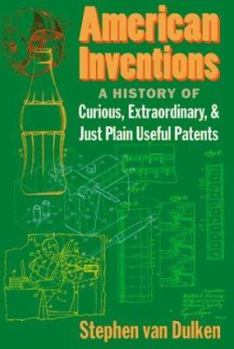American Inventions: A History of Curious, Extraordinary, and Just Plain Useful Patents
Select Format
Select Condition 
Book Overview
Every American knows that Thomas Alva Edison's most famous invention was the light bulb, but who invented the pregnancy test? How was the airbag invented? How was the first computer patented? Stephen van Dulken examines the way inventions and patents such as these have helped to create the "American Dream."
Between 1911 and 1999, the number of registered U.S. patents rose from 1 million to 6 million. Showcasing dozens of those original patent...
Format:Hardcover
Language:English
ISBN:0814788130
ISBN13:9780814788134
Release Date:March 2004
Publisher:New York University Press
Length:288 Pages
Weight:1.40 lbs.
Dimensions:1.1" x 6.4" x 9.4"
Customer Reviews
2 ratings
A fascinating tour of American thrift and ingenuity
Published by Thriftbooks.com User , 20 years ago
Written by an expert curator of the Patents Information Service of The British Library, American Inventions: A History Of Curious, Extraordinary, & Just Plain Useful Patents is an amazing showcase featuring dozens of original patent drawings from the U.S. Patent and Trademark Office, revealing unique and unforgettable American inventions from the Frisbee to bobby pins and in-line skates. An extremely well-researched and fascinating tour of American thrift and ingenuity throughout the twentieth century.
Cleverness on Every Page
Published by Thriftbooks.com User , 20 years ago
The system of patents is so important to our nation that it is part of the Constitution, Article 1, stating, "To promote the Progress of Science and useful Arts, by securing for limited Times to Authors and Inventors the exclusive Right to their respective Writings and Discoveries." Patents started being numbered in 1836, and by 1911 there were a million of them; by 1999, six million. Some have changed the world, and some have never left the drawing board, and some are downright goofy (but innovative). In a surprisingly captivating work, _American Inventions: A History of Curious, Extraordinary, and Just Plain Useful Patents_ (New York University Press), Stephen van Dulken, who works with patents at the British Library, shows some oddities and marvels that he has sifted from those millions of bright ideas. There are plenty of good and not-so-good inventions here, but every page has good stories.Like the Frisbee. Yale students could recall that in the 1920s they threw pie tins from the Frisbie Baking Company (there is one in the Smithsonian). In 1948, inventors, inspired by the nation's interest in flying saucers, made the first plastic flying disc, better than metal, but it was brittle and snapped. In 1951 Walter Morrison redesigned it with the aerodynamic rim known as the "Morrison slope" and called it the Pluto Platter. It was patented as a "flying toy" in 1957, the year Wham-o brought it out, and it had little portholes from which imaginary aliens might enjoy a rapidly spinning world going by. Wham-o was distracted by the hula hoop madness, and eventually relaunched the disc as Frisbee in 1958. It has, of course, long outlasted hula hoops, and will never go out of date. Someone invented the drive-in theater; Richard Hollingshead's mother complained that movie seats were too narrow, and he wondered if sitting in a car would be more comfortable. Remotes for televisions were originally on a wire, then via photocells, and ultrasound, before they became electronic. Joyce Hall of Hallmark Cards invented the card display rack; before that, greeting cards were kept in drawers. Recipes can be patented; KFC has a patent on its chicken recipe, but Coke does not patent its syrup, preferring to keep the ingredients simply secret rather than eventually in the public domain.This is a wonderful miscellany of cleverness. The text has reproductions of the drawings from many of the patents mentioned: the original shopping cart, the Murphy bed, Buckminster Fuller's Dymaxion House, the board for "The Landlord's Game" (a forerunner of Monopoly), the original Barbie and Raggedy Ann, the famous Coke bottle, and many more. In a dry, amused tone, van Dulken makes the book something more than just a description of one invention after another. He has displayed the admirable human trait of inventiveness and thereby shown a social history of technological progress.




